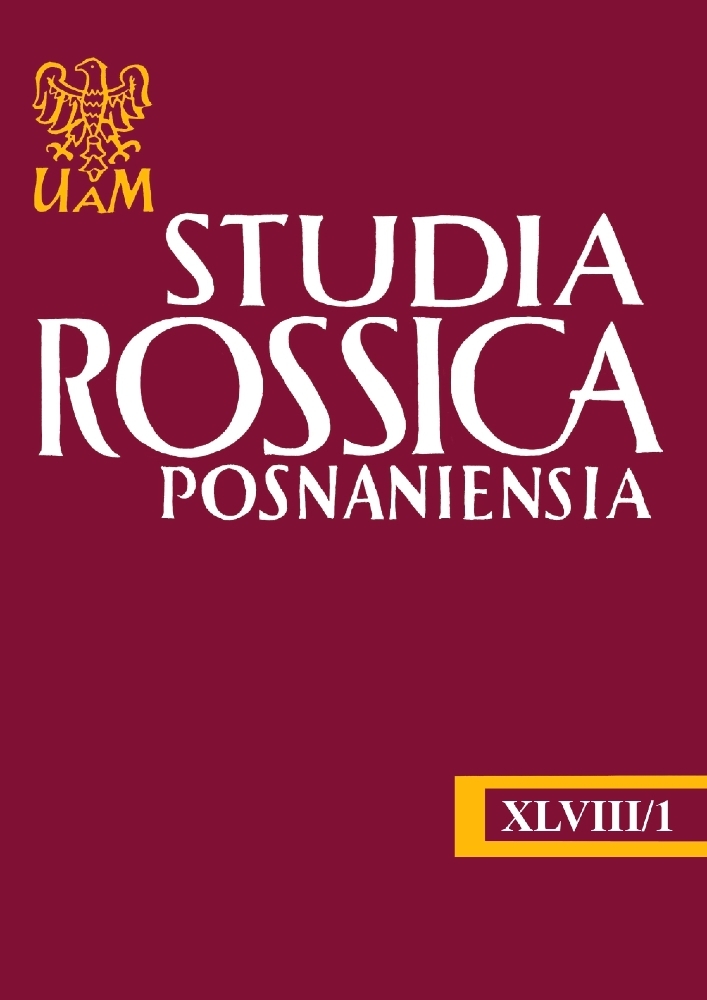Abstrakt
This article provides a comparative analysis of Ivan Mazepa – the protagonist in the poems Mazeppa (1819) by George Gordon Byron and Poltava (1829) by Alexander Pushkin. It gives a brief outline of who Mazepa was to identify the reasons for this historical figure to have attracted the considerable attention of the Great Romantics. Deploying the theoretical method on recognition and the juxtaposition of differences of literary works within Reception theory developed by Mary N. Layoun, the article examines aspects of dissimilarity in the literary portrayals of the image of Mazepa in Byron’s and Pushkin’s poems. The juxtaposition of Mazeppa and Poltava explains ways in which details from Mazepa’s biography and exploits that inspired Byron’s creative imagination and kindled his desire to recount the story of Mazepa can be contrasted with Pushkin’s presentation of the same protagonist as generated by his own viewpoints on the political aspects surrounding the events of the Great Northern War, specifically the Battle of Poltava. The article applies Hans Robert Jauss’s concept of the horizon of expectations to examine the case of Pushkin’s reception of Byron. It argues that what underlies the nature of Pushkin’s disagreement with Byron is his emotional involvement with the subject matter.
Bibliografia
Cardwell, Richard A., ed. The Reception of Byron in Europe. London & New York, Thoemmes Continuum A Continuum Imprint, 2004.
Clarke, Roger. “Notes on «Poltava»” in Eugene Onegin & Other Stories by Alexander Pushkin. Trans. by Roger Clarke. Hertfordshire, Wordsworth Classics of World Literature, 2005.
Debreczeny, Paul. “The Reception of Pushkin’s Poetic Works in the 1820s: A Study of the Critic’s Role”. Slavic Review, 28 (3), 1969, p. 394–415. DOI: https://doi.org/10.2307/2494018
Du Bois, William Edward Burghardt. “Pushkin”. Phylon (1940–1956), 1 (3), 1940, p. 240–269. DOI: https://doi.org/10.2307/271992
Greenleaf, Monika. “Pushkin’s Byronic Apprenticeship: A Problem in Cultural Syncretism”. Russian Review, 53 (3), 1994, p. 382–398. DOI: https://doi.org/10.2307/131193
Holub, Robert. Reception Theory. A Critical Introduction. London–New York, Methuen, 1984. DOI: https://doi.org/10.2307/1771944
Kushner, Eva. Itineraries in Comparative Literature. The Living Prism. Montreal–Kingston, McGill-Queen’s University College, 2001.
Layoun, Mary. “Endings and Beginnings: Reimagining the Tasks and Spaces of Comparison”. New Literary History, 40 (3), 2009, p. 583–607. DOI: https://doi.org/10.1353/nlh.0.0098
Lednicki, Wacław. “Pushkin, Tyutchev, Mickiewicz and the Decembrists: Legend and Facts”. The Slavonic and East European Review, 29 (73), 1951, p. 375–401. Web. 01.06.2014. http://www.jstor.org.remote.library.dcu.ie/stable/4204246.
Lord Byron, Mazeppa. BiblioLife, The University of California Libraries, 2008.
“Lûdi ne očenʹ hotât znatʹ svoû nastoâŝuû istoriû”. Istorik Tatʹâna Tairova-Âkovleva v intervʹû Gromadskomu. Web. 25.05.2017. https://www.youtube.com/watch?v=IrRGhJozkm8.
Nabokov, Vladimir. “Problems of Translation: «Onegin» in English”. The Translation Studies Reader. Ed. Lawrence Venuti. London–New York, Routledge, 2012, p. 71–83. Web. 29.12.2022. https://translationjournal.net/images/e-Books/PDF_Files/The%20Translation%20Studies%20Reader.pdf.
O’Neil, Catherine. With Shakespeare’s Eyes. Pushkin’s Creative Appropriation of Shakespeare. Newark, University of Delaware Press; London, Associated University Presses, Delaware, 2003.
Pauls, John. Pushkin’s Poltava. New York, Shevchenko Scientific Society, 1962.
Pelenski, Christina. “Delacroix’s Mazeppa Oil Painting Rediscovered”. Harvard Ukrainian Studies, 7, 1983, p. 507–519. Web. 26.07.2021. https://www.jstor.org/stable/41036112.
Pushkin, Alexander. Eugene Onegin & Other Stories. Transl. by Roger Clarke. Hertfordshire, Wordsworth Classics of World Literature, 2005.
Siundiukov, Ihor. “Tatiana Tairova-Yakovleva: «Hetman Mazepa is a remarkable figure that will pique interest for centuries to come»”. The Day, 32, 2008. Web. 21.10.2008. https://day.kyiv.ua/en/article/society/tatiana-tairova-yakovleva-hetman-mazepa-remarkable-figure-will-piqueinterest.
Smyrniw, Walter. Hetman Ivan Mazepa in Life and Literature, p. 1–17. Web. 29.12.2022. https://uocc.ca/wp-content/uploads/2018/08/Mazepa-Life-Lit-Final-Draft-web.pdf.
Tairova, Tatʹâna. Putʹ Mazepy. Web. 30.11.2021. https://www.youtube.com/watch?v=fTp1LYkfH-1w&t=3031s.
Voltaire. The History of Charles XII, King of Sweden. Internet Archive Online. Web. 14.07.2014. http://www.archive.org/stream/voltaireshistory00voltuoft/voltaireshistory00voltuoft_djvu.txt.
Licencja
Prawa autorskie (c) 2023 Tatiana Krol

Utwór dostępny jest na licencji Creative Commons Uznanie autorstwa – Użycie niekomercyjne – Na tych samych warunkach 4.0 Międzynarodowe.

